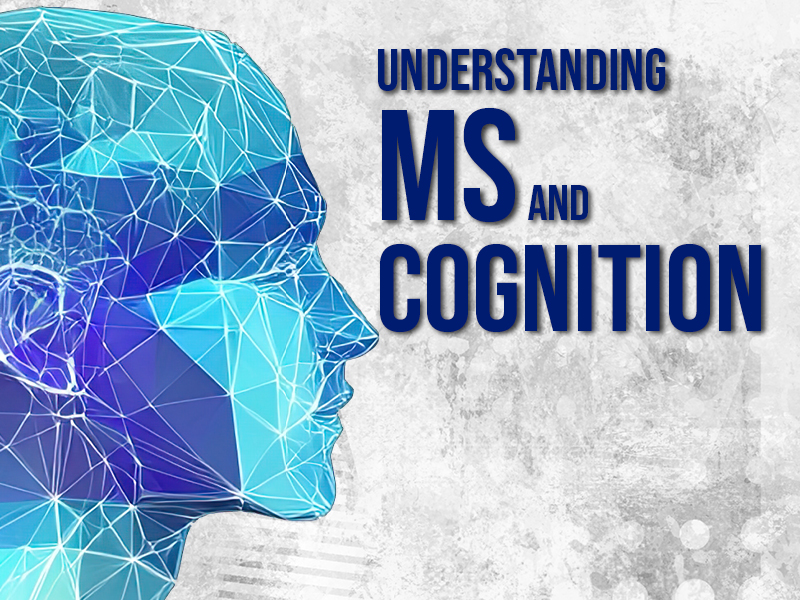
For many individuals living with multiple sclerosis, some of the most disruptive symptoms are invisible and insidious. Changes in thinking, memory, and mental clarity — collectively referred to as cognitive symptoms — are common, impactful, and too often overlooked.
These cognitive shifts can feel like losing your mental footing: struggling to find the right word or taking longer to process conversations or new information. At times, these issues are brushed off as stress or aging. At other times, they go unmentioned entirely — either because the changes are subtle or because it’s hard to talk about something so intangible.
Cognitive symptoms are a common concern for many people with MS. Research suggests that over half of individuals with MS will experience some form of cognitive change. However, these symptoms are often overlooked during routine medical appointments, with many people not being asked about them or offered specific tools to help manage the challenges they pose.
This issue of InforMS offers a broad overview of cognition in MS: what we know, what research is uncovering, and most importantly, what people with MS and their loved ones can do to adapt and thrive.
What Is Cognitive Dysfunction in MS?
Cognition refers to the mental processes that allow us to think, reason, remember, and plan. In MS, these functions can be disrupted due to damage in the central nervous system. While the severity and type of changes vary widely, common cognitive symptoms include:
- Slower processing speed: Taking longer to understand information or respond.
- Difficulty focusing: Trouble maintaining attention or being easily distracted.
- Memory issues: Struggling to recall information.
- Word-finding difficulties: Knowing what you want to say but unable to retrieve the word.
- Challenges with executive function: Problems with organizing, multitasking, or planning.
Why Do These Changes Happen?
MS is a disease of the central nervous system. It causes inflammation, demyelination, and sometimes brain atrophy, all of which can disrupt cognitive functions. White matter damage, particularly in regions that support communication between brain areas — like the corpus callosum, frontal lobes, and temporal lobes — can impair the transmission of information.
- Cognitive changes in MS are most often linked to:
- White matter lesions, especially in areas that support communication between different parts of the brain.
- Gray matter atrophy, which can affect memory and emotional processing.
- Inflammation and brain volume loss, which interfere with overall brain efficiency.
I have difficulty remembering words and conversations. I really have to focus to remember things, and write them down in numerous places so I don’t forget.
— CYNTHIA M.
Dr. Brian Hoyt, a neuropsychologist who specializes in MS-related cognitive issues, describes it this way: “Think of it as a traffic problem. Your brain still has the information, but the usual routes are damaged or under construction. That slows things down, or makes processing more effortful.”
Complicating things further are indirect contributors — conditions that don’t directly cause cognitive symptoms but can intensify them. These include fatigue, depression, anxiety, sleep problems, pain, and side effects from medications. Teasing apart the multitude of factors is key, and often requires a specialized neuropsychological evaluation.
How Common Are Cognitive Symptoms in MS?
Cognitive dysfunction affects approximately 40% to 65% of people with MS, and for about 20% to 25%, these symptoms significantly impact daily functioning. These challenges can emerge at any stage — even early in the disease, sometimes before physical symptoms appear.
What’s especially important to understand is that cognitive symptoms don’t always follow the same trajectory as physical disability. People who appear physically well or don’t experience severe MS-related symptoms may still struggle with thinking or memory. Likewise, cognitive symptoms can fluctuate: stress, poor sleep, heat sensitivity, or fatigue can make a bad day feel worse.
This variability is part of what makes cognitive issues so frustrating — and why consistent support and monitoring matter.
What Does the Research Show?
Scientific interest in MS-related cognition has expanded dramatically in recent years. With better imaging tools like MRI, including functional MRI (fMRI) and diffusion tensor imaging (DTI), which are MRI techniques that show different aspects of changes in brain tissue, researchers are uncovering how MS impacts brain networks involved in memory, attention, and processing. Key findings include:
- Gray matter loss — particularly in the hippocampus and cortex — often correlates more strongly with cognitive impairment than white matter lesions.
- Brain network connectivity — the “communication efficiency” of different brain regions — is a powerful predictor of cognitive performance.
- Cognitive reserve — a concept describing the brain’s ability to adapt and compensate for damage — can explain why some people maintain better function despite similar lesion loads.
People with a physically active and overall healthy lifestyle, mentally stimulating hobbies, higher levels of education, or complex occupations may build greater cognitive reserve, giving them more resilience against cognitive symptoms. This has important implications for how we approach brain health in MS — not just treating damage but actively building resilience.
Hearing from People with MS: The Lived Experience
For many, cognitive symptoms feel like a fog—a sense of being slightly out of sync with the world around them. It’s not always about forgetting, but about the extra effort it takes to recall a word, follow a conversation, or make a quick decision.
These changes are often subtle at first and can go unnoticed by others. But for the person experiencing them, the impacts on work, relationships, and identity can be profound.
In his book Facing the Cognitive Challenges of MS, award-winning author and MS advocate Jeffrey Gingold explains: “Without warning, many people with MS are suddenly faced with an inability to process routine thoughts. Their decision-making may be stonewalled, befuddling simple conversations into a word-finding struggle. Others may lose their bearings in their own backyard or kitchen, or suddenly the face of a spouse or friend will appear unfamiliar. Then, the shroud over their memory recall lifts, defying explanation, and leaving no trace of the bait and switch. The individual’s cognitive functions have been compromised and often go undiagnosed, creating a deep chasm of hidden disability.”
Stress seems to make the situation much worse for me, so if I find myself getting too frustrated I try to stop and take a breath and relax for a moment before I continue on.
— N. C.
In a study exploring the impact of cognitive impairment on adults with MS (Halstead et al., 2021), many individuals expressed deep frustration and emotional distress over how cognitive difficulties disrupted their daily lives and sense of self. Participants reported a range of challenges, from memory lapses to difficulties concentrating and processing information. One participant shared, “I find it annoying when I forget something,” highlighting how even minor forgetfulness—such as misplacing items or missing appointments—can accumulate and take a toll. Another individual explained, “I’m frustrated by the loss of my ability to read like I used to,” reflecting the grief that comes with losing the ability to engage in once-beloved intellectual or leisure activities.
Others described moments of embarrassment or fear in social settings when they struggled to find the right words, follow conversations, or recall familiar names. For many, these cognitive changes led to feelings of diminished self-confidence and increased reliance on support partners, further complicating their emotional well-being and relationships. This study underscores the profoundly disruptive nature of cognitive impairment in MS, not only in terms of functional limitations but also in its impact on identity, self-esteem, and daily rhythms of life.
I use a shopping list and cross off the items as I put them in the trolley otherwise I still forget things. If I have a few things going on in one day I write them down in the morning, I find the act of writing them helps as well as having a list independent of the calendar on my phone.
— NICKY W.
The Role of Support Partners
Cognitive symptoms don’t only affect the person with MS — they affect their families, partners, coworkers, and friends. Yet because these symptoms are invisible, misunderstandings are common.
Support partners can play a key role by:
- Offering patience and understanding when conversations slow down.
- Avoiding the urge to “correct” or finish someone’s sentence.
- Recognizing mental fatigue as just as real and taxing as physical fatigue.
- Helping create and maintain routines that reduce decision-making demands.
Sometimes, just acknowledging that someone is struggling — without minimizing it — can be a powerful form of support.
Lived Wisdom: Cognitive Strategies from an MS Perspective
In his excellent book, Mental Sharpening Stones, Gingold shares powerful insights from individuals navigating cognitive changes with MS. One individual offers a deeply practical and compassionate roadmap for managing cognitive function:
- Work with your body’s rhythm: Recognize the predictable highs and lows in your daily functioning. Schedule cognitively demanding tasks during your peak times.
- Adapt, don’t doubt: Intelligence, education, and experience remain intact. Cognitive challenges require us to adjust how we use them—not question their value.
- Know your limits and strengths: Understand where your cognitive difficulties lie, and lean into tasks that energize and align with your strengths.
- Structure your time intentionally: Tackle challenging tasks when you’re at your sharpest and regularly engage in activities that mentally uplift you.
- Be kind to yourself: Let go of perfectionism. Mistakes are part of learning — trial and error is a productive path.
- Build cognitive safety nets: Use tools and systems to support areas of weakness, especially memory. Don’t burden yourself with the task of remembering everything.
- Delegate and prioritize: Focus your cognitive energy where it matters most, and don’t hesitate to delegate when possible.
- Seek support and accountability: A trusted mentor or partner can offer feedback, encouragement, and perspective.
These strategies reflect resilience, self-awareness, and the importance of adapting with intention. They’re not just coping mechanisms — they’re successful ways to live well with MS.
Staying Empowered
Cognitive symptoms in MS are real, common, and manageable. With early identification, multi-faceted strategies, and a supportive care team, it’s possible to stay engaged, active, and confident.
Supporting brain and cognitive health means taking a proactive and holistic approach: engaging in regular physical activity, mentally stimulating hobbies, getting quality sleep, managing stress, maintaining social connections, and fueling your body with a balanced diet.
No matter where you are in your experience with MS, it’s never too early — or too late — to focus on brain health. Start the conversation with your care team and explore the strategies that work best for you. Small, consistent changes can lead to meaningful improvements in how you think, feel, and function every day.
And starting the conversation is key. Whether you’re newly diagnosed or years into living with MS, talking openly about cognitive changes — with your doctor, therapist, or support network — can be the first step toward reclaiming clarity and control.
Resources & Next Steps
For more on specific cognitive strategies, see Seven Things You Can Do Today.
For a professional perspective, see our interview with Dr. Brian Hoyt: Recognizing and Navigating Cognitive Changes in MS.
For a list of helpful resources, see Learning More About Cognition in MS: A Look at MS Center Education Resources.
For more information about Social Security Disability Insurance and Cognitive Symptoms, see Planning Ahead for Cognitive Challenges and Disability with MS.






